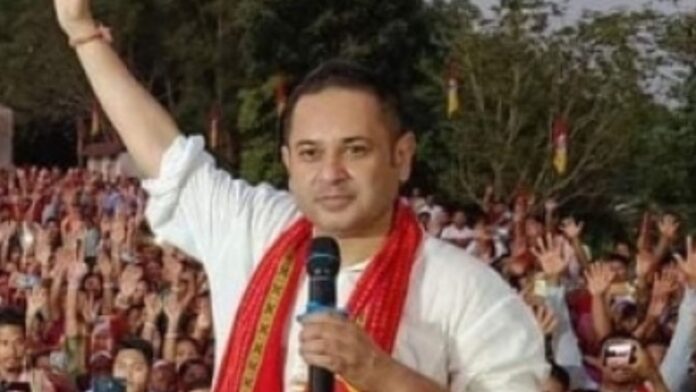AGARTALA:
In the past over five and a half decades, tribal-based parties in Tripura raised tribal-centric demands including the creation of the tribal autonomous body, Roman script for the tribal Kokborok language, adopting traditional customary laws, wearing traditional attire, but on their own, they achieved little being short-lived in the absence of a serious ideology.
Since 1967, more than a dozen tribal-based parties in Tripura emerged and they have tried to play a crucial role in the state’s electoral politics, but due to their issue-based politics sans any ideology, they became non-existent after their issues were resolved or when they raised irrelevant demands.
Of Tripura’s four million population, tribals, with 19 communities, constitute one-third and out of 60 assembly seats, twenty reserved for the tribals, who belong to both Hindu and Christian faiths.
Of the state’s two Lok Sabha seats, one – Tripura East — is reserved for the tribals, who in terms of economic status are better than the tribals of other states in the northeast region and other parts of the country.
In June 1967, the Tripura Upajati Juba Samity (TUJS) was formed as the first major tribal party, raising some tribal-centric demands including the creation of the tribal autonomous body.
After continuous agitations by the CPI-M-led Left parties, the TUJS and a section of Congress leaders, the Tripura Tribal Areas Autonomous District Council (TTAADC) was formed in 1985 under the Sixth Schedule of the Constitution to protect and safeguard the political, economic and cultural interests of the tribals.
The TTAADC, which has a jurisdiction on over two-thirds of Tripura’s 10,491 sq km area and is home to over 12,16,000 people, of which around 84 per cent are tribals, is, in terms of its political significance, second to the Tripura Assembly.
Tribal parties, including the Tipra Motha Party (TMP) and Indigenous People’s Front of Tripura (IPFT), along with the Left parties, are now demanding more constitutional power and more funds for the TTAADC.
The TMP, led by former royal scion Pradyot Bikram Manikya Deb Barman, has been governing the TTAADC since April 2021 while the IPFT is an ally of the ruling BJP.
Both the TMP and the IPFT, to capitalise the tribal vote bank, raise tribal-centric demands like the upgradation of the TTAADC as a separate for the tribals even though they are fully aware that such demand would never be fulfilled due to obvious reasons.
The TMP, before and after capturing the TTAADC, has been demanding the elevation of the areas of the autonomous body by granting a ‘Greater Tipraland State’ or a separate state status under Articles 2 and 3 of the Constitution.
Both TMP and the IPFT in support of their separate state-like demands organised agitations both in the state and in the national capital Delhi.
The ruling BJP, CPI-M-led Left parties, Congress and the Trinamool Congress have been strongly opposing the demands of both the IPFT and the TMP.
The TMP, in its maiden electoral battle, fielded 42 candidates, including 20 on tribal reserved seats, in February Assembly polls, and bagged 13 seats and 19.69 per cent votes as it highlighted its demand for ‘Greater Tipraland State’ or a separate state.
However, after the announcement of the results of the February 16 assembly polls on March 2, the TMP gradually shifted its stand on the demand.
Now the party is demanding the adoption of the Roman script for the tribal Kokborok language, the second official language in Tripura.
TMP chief Deb Barman said that his party would continue to fight for the all-round development of the tribals, who, according to him, were deprived by the mainstream and national parties.
Deb Barman, who was a close friend of Congress leader Rahul Gandhi, was the President of Tripura Congress but quit the party in September 2019 over the Citizenship (Amendment) Act and the National Register of Citizens (NRC) issues.
Political commentator and writer Satyabrata Chakraborti said that the tribal parties, raising sentimental and tribal-centric demands, achieved electoral gains but after the elections, they remained indifferent over their demands and are even though not even serious over the basic problems of tribals.
“Roads, electricity supply, health services, educational facilities and various other infrastructures are not good in the tribal areas. The tribal-based parties are only focusing on the sensitive, ethnic and emotional issues to get the electoral mileage, forgetting the tribals’ day-to-day issues and problems,” Chakraborti told IANS.
Political analyst and author Sekhar Datta termed Deb Barman’s politics as “most opportunistic”.
“What is the meaning and structure of Greater Tipraland State? He is yet to convince the people of Tripura about his demand. He is misleading the people, especially the tribals.
“The TMP somehow won 13 tribal reserved seats in the recent polls, but the party’s success and survival in future is gripped with deep uncertainty as more than a dozen tribal-based parties have vanished in the past six decades in Tripura,” Datta told IANS.
However, many of the former kings have promoted Bengali culture and maintained close relations with many top personalities including Nobel laureate poet Rabindranath Tagore and Acharya Jagadish Chandra Bose.
Tagore’s close relations with the princely state of Tripura and its four successive tribal kings form an important chapter in the state’s history.
This relationship prompted the world-famous bard to visit the state as many as seven times between 1899 and 1926.


